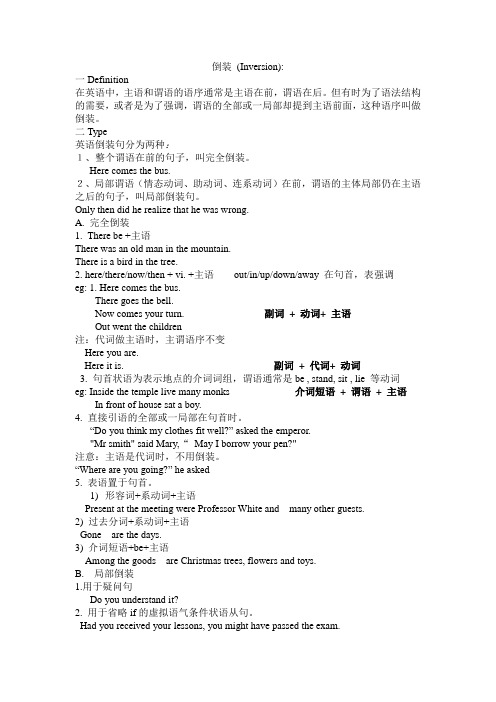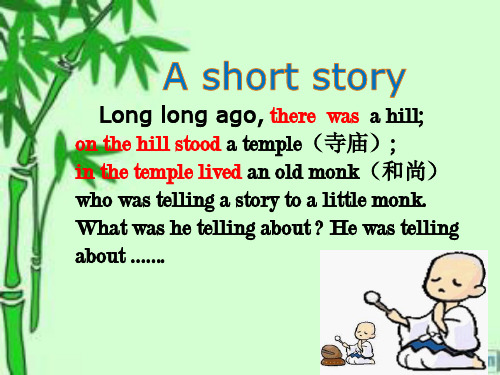倒装句(公开课!!)
《倒装句公开课》课件

倒装句与其他句型的比较
陈述句
陈述句是常见的句子类型,其结构简 单明了,主要用于描述事实或表达观 点。例如:“The sun rises in the east.”
疑问句
祈使句
祈使句用于表达请求、命令或建议, 其结构简单,通常以动词原形开头。 例如:“Please close the door.”
疑问句通过改变语序来表达疑问或询 问信息,其结构与陈述句不同。例如 :“Where do you live?”
在倒装句中应避免出现冗余重 复的词语,使句子表达更加简
洁明了。
语法错误
在倒装句中应避免出现语法错 误,如时态、语态等。
提高倒装句运用能力的建议
多读多写
通过多读多写,熟悉各种 类型的倒装句,提高对倒 装句的运用能力。
注意观察
在日常生活中注意观察语 言现象,积累语言素材。
勤于思考
在运用倒装句时勤于思考 ,总结规律,加深对倒装 句的理解。
复杂倒装句实例
01 总结词
结构复杂,需要仔细分析
02 详细描述
03 总结词
表达强烈情感或强调某个事实
复杂倒装句通常涉及到多个句 子成分的颠倒,如“Not only did he win the game, but also he scored the most points.”,强调的是“he scored the most points”。
VS
详细描述
倒装句的语法结构有多种形式。其中,前 置词引导的结构是指由前置词引导的倒装 句,如“Here comes the bus”。疑问 句的结构是指疑问句采用倒装的形式,如 “Is she beautiful?”。虚拟语气的结构 是指虚拟语气中的倒装句,如“If only I were you”。
《倒装句》课件

• 倒装句的定义与分类 • 倒装句的使用条件与规则 • 倒装句与正常语序的区别与联系 • 倒装句在英语写作中的应用 • 练习与巩固
01
倒装句的定义与分类
什么是倒装句
倒装句的定义
倒装句是一种特殊的语法结构, 指句子成分的位置与常规语序不 同。
倒装句的分类
根据倒装的成分不同,倒装句可 分为部分倒装和完全倒装两类。
04
倒装句在英语写作中的应用
倒装句在英语写作中的重要性
丰富语言表达
倒装句能够打破常规的语序,使 句子更加生动、形象,增强语倒装句,可以将句子的重点放 在句首或句尾,突出强调某个信息 ,使读者更加关注。
平衡句子结构
在英语写作中,有时为了平衡句子 的结构,可以使用倒装句来调整语 序,使句子更加流畅、自然。
倒装句的分类
部分倒装
部分倒装是指句子中的一部分(如谓 语、表语、宾语等)提前到句首,其 他成分仍保持正常语序。
完全倒装
完全倒装是指整个句子成分全部提前 到句首,通常只包括主语和谓语,有 时还包括宾语等。
倒装句的语法功能
01
02
03
强调
通过改变语序,倒装句可 以突出强调某个句子成分 ,使表达更加鲜明有力。
03
倒装句与正常语序的区别与联系
倒装句与正常语序的区别
语序不同
倒装句的词语顺序与正常语序不同,而正常语序则遵循一定的语法规则和习惯 。
强调重点不同
倒装句可以通过改变语序来强调某个词语或短语,而正常语序则按照固定的顺 序排列,强调的重点相对固定。
倒装句与正常语序的联系
语法规则
倒装句和正常语序都遵循一定的语法规则,这些规则决定了词语的正确排列顺序 。
公开课教案(倒装句)

倒装(Inversion):一Definition在英语中,主语和谓语的语序通常是主语在前,谓语在后。
但有时为了语法结构的需要,或者是为了强调,谓语的全部或一局部却提到主语前面,这种语序叫做倒装。
二Type英语倒装句分为两种:1、整个谓语在前的句子,叫完全倒装。
Here comes the bus.2、局部谓语(情态动词、助动词、连系动词)在前,谓语的主体局部仍在主语之后的句子,叫局部倒装句。
Only then did he realize that he was wrong.A. 完全倒装1.There be +主语There was an old man in the mountain.There is a bird in the tree.2. here/there/now/then + vi. +主语out/in/up/down/away 在句首,表强调eg: 1. Here comes the bus.There goes the bell.Now comes your turn. 副词+ 动词+ 主语Out went the children注:代词做主语时,主谓语序不变Here you are.Here it is. 副词+ 代词+ 动词3. 句首状语为表示地点的介词词组,谓语通常是be , stand, sit , lie 等动词eg: Inside the temple live many monks 介词短语+ 谓语+ 主语In front of house sat a boy.4. 直接引语的全部或一局部在句首时。
“Do you think my clothes fit well?” asked the emperor."Mr smith" said Mary,“May I borrow your pen?"注意:主语是代词时,不用倒装。
“Where are you going?” he asked5. 表语置于句首。
高中英语语法 倒装句-----公开课 (共36张)

4. as 引导的让步状语从句中要提前名词、形容词、 副词和动词原形。
________, he knows a lot of things.
about …….
Learning Aims
By the end of this lesson, we should be able to have a good knowledge of ◆ inversion ◆ how to solve problems related to
inversion
There be (live/stand/ lie/ seem/ happen/appear…) 全部倒装
Long long ago, there was a hill.
桌子上有一本书,两个橙子。
There __is___one book and two oranges on the
desk. (be) 山顶有棵大树。 T_h_e_r_e__st_a_n_d_s__a_b__ig__tr_e_e on the top of the hill.
2__G_r_o_w__in_g__o_n__t_h_e__h_il_l_ (长在山上) are
varieties of flowers and plants. (grow) 3 _G_o_n__e_a_r_e__th__e_d__a_y_s(日子一去不复返了) when our
2024届高考英语倒装句课件(共26张PPT)

试卷讲评课件
4.表语置于句首时e +主语.
e.g. Happy are those who are contented.知足者常乐.
e.g. Present at the meeting were twenty teachers and thirty students.
倒装句
一、完全倒装 二、部分倒装
一、完全倒装
试卷讲评课件
整个谓语放在主语前 结构:谓语动词+主语 e.g. Away went the boy. 那个男孩走开了. 1.表示方向、时间或方位,地点的副词或介词短语,置于句首,用完全倒装. 如: here, there, now, then , up. down.in. out. away. in the room . on the wall 等。(注:主语必须是名词;若主语是代词不能倒装.)
e.g. On the table were some flowers. Then followed three days of heavy rain. Out rushed the children laughing loudly.
试卷讲评课件
2.Such置于句首时,用完全倒装。(注:such / so …that…中, such /so部 分位于句首时,句子用部分倒装.) E.g. Such are the facts: no one can deny them. 这些就是事实,没有人能否定它们. e.g. So much homework did we have to do that we had no time to have a rest.
Book 5 unit4 倒装句公开课ppt课件

hadn't time to think.
23
Translate the following sentences
using inversion.
1. 飞机飞下来了。
Down _f_li_e_s t_h_e_ _p_la_n_e_.
2. 虽然他年轻,他很勇敢。
_Y_o_u_n_g_ a_s_ he _is__, he is very brave.
good marks for all the courses he had taken.
Not only _d_i_d_ _J_im__m_ ypass the exam, but
_h_e__ __g_o_t __ good marks for all ...
22
3. He only found out an hour ago that an accident had happened to his son.
bus started.
11
1. Not only __________ not be afraid of difficulties, but also ________ try our best to overcome them.
A. we should, we should B. we should, should we C. should we, we should D. should we, should we
— John won the first prize in the contest.
— So he did. “的确如此”15
4. if 虚拟条件句的谓语动词中含有were, had, should时, 省去if, 把were, had, should提到 主语前时。
公开课倒装句PPT课件

第5页/共45页
3. 当表示地点的介词词组在句首时。 翻译,总结用法3:
(1) In the temple lived an old monk.
(2) 0n every picture of paper was a picture of horse. (3) In the front of the lecture hall sits a professor.
enjoy more. 6. The names of those who were late yesterday are
written on the blackboard. 7. One knows its value, only when one lose
freedom.
第26页/共45页
6) the hour we had been looking forward to came then. 7) A beautiful palace stands there at the foot of the hill. 8) He rushed out , with a stick in his hand. 9) A fat man sat under a big tree , half asleep.
第17页1) Only in this way ____ make progress in
your English.
A. you
B. can you
C. you be able to D. will you able to
(2) Only when the meeting was over ___go
昊黎
第1页/共45页
主讲人:戚
一.英语句子的基本语序和倒装语序: 1.英语句子的基本语序(主语+谓语+其他成份):
高考文言文倒装句(公开课)

高考文言文倒装句(公开课) 【学习目标】一、初步感知文言文倒装句的基本类型,并尝试归纳总结其大致规律;二、学以致用,能将其运用于文言阅读的翻译中。
【学习重难点】重点理解分析宾语前置及定语后置的几种常用规律类型。
【学习课时】一课时【学习过程】一、宾语前置(一)大王来何操?沛公安在?王问:“何以知之?”微斯人,吾谁与归?而彼且奚适也?彼且恶乎待哉?胡为乎惶惶欲何之?奚以之九万里而南为?规律1:疑问句中,疑问代词做宾语,宾语前置。
P.S.常见的疑问代词:何、谁、孰、恶、安、焉、胡、奚、曷。
(二)古之人不余欺也。
然而不王者,未之有也。
而莫之夭阏者不吾知其亦已兮三岁贯汝,莫我肯顾忌不自信规律2:否定句中,代词做宾语,宾语前置。
P.S.(1)否定副词:不、弗、莫、未、非、毋……(2)代词:余、吾、尔、自、是……P.S.“相”表单方的副词(你、我、他),“见”表单方的副词(我)。
“渠”代词。
(三)句读之不知,惑之不解。
何厌之有?何陋之有?唯命是从唯利是图规律3:宾语+“之”/“是”+谓语P.S.宾语前置固定句式:何……之有,唯……是(四)一言以蔽之。
项王东向坐;亚父南向坐……沛公北向坐;张良西向侍。
规律4:名词/名词性短语+介词(以、向、于、与、自)+谓语小结:二、定语后置(一)太子及宾客知其事者,皆白衣冠以送之。
计未定,求人可使报秦者未得。
群臣侍殿上者。
人马烧溺死者甚众。
石之铿然有声者,所在皆是也。
(苏轼《石钟山记》)规律1:中心语+定语(动词性:主谓/动宾)+“者”P.S.判断“客之美我者,欲有求于我也”是否为定后句式?(否)启示:规律并非万能的,具体语境需要具体分析问题。
(二)马之千里者,一食或尽粟一石。
蚓无爪牙之利,筋骨之强,上食埃土……仰观宇宙之大,俯察品类之盛。
苟以天下之大,而从六国破亡之故事。
规律2:中心词+“之”+定语秦王购之金千斤,邑万家。
吏二缚一人诣王。
《晏子使楚》规律3:三、状语后置青,取之于蓝,而青于蓝。
倒装句讲解精品PPT课件全文

❖ 7. Only in recent years have women begun to catch up with men in this area.
2)当这些词作形容词修饰主语时且置句首 时,句子不倒装。 Little work was done yesterday.
5.Neither..nor连接的两个句子都要倒装; not only…but also连接的两个句子时, not only后面的句子要倒装, but also不倒装
1)Neither has he called on her, nor will he do so. 2)Not only shall we learn from books,
No sooner had they entered the house than it began to rain.
注意
1)当上述单词不提前时,则不倒装。 I seldom read newspaper before. He had hardly finished his homework when the light went out.
一、完全倒装
1. 在there, here 引导的句子中,谓语是 be, exist, live,lie 等表示状态的不及 物动词。
There is nobody in the classroom. There seems something wrong with my radio. There stands a temple on the top of the mountain.
《公开课倒装句》课件

倒装句的定义
倒装句是一种语法表达者为了强调、突出某个成分而颠倒原有语序的句式结构 倒装句分为部分倒装和完全倒装两种形式 部分倒装是指谓语部分在主语之前,而完全倒装则是整个谓语和主语的位置颠倒 倒装句的使用可以起到强调、突出某个成分的作用,使句子更加生动有力
倒装句的分类
完全倒装:谓语+主语+其他 成分
公开课倒装句
汇报人:PPT
汇报时间:20XX/XX/XX
YOUR LOGO
目录
CONTENTS
1 单击添加目录项标题 2 公开课背景介绍 3 倒装句的定义和分类 4 倒装句的构成要素和特点 5 倒装句的运用场景和注意事项 6 公开课倒装句实例解析
单击此处添加章节标题
公开课背景介绍
公开课的目的和意义
倒装句的运用场景和注意事项
运用场景
强调重点:通过倒装句强调某个词语或短语
避免头重脚轻:为了使句子结构更加平衡,避免主语过长而谓语过短
突出强调:为了突出某个部分的重要性,将其放在句首,后面的句子则采 用倒装结构 遵循语法规则:在某些特定的语法结构中,必须采用倒装句式才能使句子 更加通顺和符合语法规则
展望未来
倒装句研究将不断深入,更 多研究成果将涌现
倒装句教学将更加注重实际 应用
倒装句教学将更加注重与现 实生活的联系
倒装句教学将更加注重与其 他语言技能的融合
THANK YOU
汇报人:PPT
汇报时间:20XX/XX/XX
YOUR LOGO
公开课倒装句实例解析
实例展示
否定词后置的倒 装句
疑问词后置的倒 装句
强调语气的倒装 句
特殊语序的倒装 句
解析过程
倒装句的定义和分类
文言文复习专题之文言文句式—倒装句全市公开课

第一种类型:
否定句中代词作宾语时,宾语前置。
动词宾语提前条件之一:
这类句子一般含有否定词:
不、弗、未、非、否、毋、无、莫
1、翻译下列句子:
• (1)不患人之不己知,患不知人也。 (《论语》) • (2)世溷(hùn,肮脏,混浊)浊而莫余知兮 • (《涉江》) 叹世道混浊而没人理解我。
2 、下列句子与其他三项不同的是:( C ) A、忌不自信 B、时人莫之许也 C、人马烧溺死者甚众 D、后世无传,臣未之闻也
第三种类型:(1)用“之” 把宾语提到动词前, 以突出强调宾语。这时的“之”只是宾语前置的 标志,没有什么实在意义。如:
下列选项中不是宾语前置的一项( C ) A、句读之不知,惑之不解。(韩愈《师说》) B、何陋之有? (刘禹锡《陋室铭》) C、 蚓无爪牙之利,筋骨之强(《劝学》) D、夫晋,何厌之有
翻译下列句子,找出它们的特点 去我三十里,惟命是听。 唯利是图。 无乃尔是过矣? 第三种类型:(2)用 “是”把宾语提到动 词前,以突出强调宾语。这时的“是”只 是宾语前置的标志,没有什么实在意义。 “是”有时,还可以在前置的宾语前加上一个范围 副词“唯”,构成“唯......是......”的格式。如: 唯命是从 唯你是问 惟兄嫂是依 《祭十二郎文》韩愈
如:“尝贻余核舟一”( 《核舟记》)
1、 选出下列句中不含定语后置的一项 (B)
A人马烧溺死者甚众 。 B 客之美我者,欲有求于我也。 C 太子及宾客知其事者,皆白衣冠 以送之。 D 石之铿然有声者,所在皆是也。
一试 身手
1、君何以知燕王? 宾语前置 2、句读之不知,惑之不解 宾前 3、豫州今欲何至?宾前 判断 4、且将军大势可以拒操者,长江也。 5、孜孜焉唯进修是急。 宾前 6、会于西河外渑池。 状后 7、未之尝闻。宾前 宾前 8、以为莫己若也。 状语后置 9、冰,水为之,而寒于水。 10、何以自托于赵。宾前 + 介词结构后置
倒装句公开课课件

only +状语、not until+状语或 +状语 状语、 状语或so 状语 状语 状语或 主句部分倒装。 开头时 ,主句部分倒装。
1. In front of the school lies a lake . 2 . From the valley came a frightening sound . 表地点的介词短语位于句首, 表地点的介词短语位于句首,谓语 表示位置或位置移动的词。 动词是 表示位置或位置移动的词。例 如come ,go ,sit ,stand ,lie ,climb , ect.时, 时 句子全倒装。 句子全倒装。
表语置于句首,句子全倒装。 六 、条件 :表语置于句首,句子全倒装。 类型 :主句倒装 形式 :主谓互换 Present at the meeting was the headmaster . Gone are the days when he led a poor life . Among them was a woman with a baby in her arms .
条件: 四、 1 条件:表地点的介词短语位于句 首,谓语动词是 表示位置或位置移动的 例如come ,go ,sit ,stand ,lie ,climb , 词。例如 ect. 2 类型:所在句倒装 类型: 3 形式:主语谓语位置互换(全倒装)。 形式:主语谓语位置互换(全倒装)。 Eg. In front of the school lies a lake . From the valley came a frightening sound .
My sister is a doctor .So is his brother. He hasn’t finished his homework . Neither has his classmate . After that we never saw her again , nor did we hear from her . so , neither , nor 在句首,表示前面 在句首, 的情况也适用另外的人或物时句子要倒 装。
- 1、下载文档前请自行甄别文档内容的完整性,平台不提供额外的编辑、内容补充、找答案等附加服务。
- 2、"仅部分预览"的文档,不可在线预览部分如存在完整性等问题,可反馈申请退款(可完整预览的文档不适用该条件!)。
- 3、如文档侵犯您的权益,请联系客服反馈,我们会尽快为您处理(人工客服工作时间:9:00-18:30)。
倒装(Inversion):
在英语中,主语和谓语的语序通常 是主语在前,谓语在后。但有时为了 语法结构的需要,或者是为了强调, 将谓语的全部或一部分提到主语的
前面,这种语序叫做倒装。
45
部分倒装
All of the predicate is before the subject
12 3
全部倒装
Other examples
of the definition of
inversion
Normal sentence order:正常语序
(subject 主+ predicate谓+ object宾)
you understand what I am saying. Only then did he realize his mistakes.
Only in this way can you learn math well.
(T) 只有我们自己才能拯救自己。
倒装可分为: a.全部倒装 b.部分倒装
倒装 Inversions
如果全部谓语放在主语之前, 叫全部倒装; 如果只把助动词或be 动词等放在主语之
前, 叫部分倒装或半倒装。
倒装难点
① 部分倒装还是完全倒装。 ② 若有主从句,哪句倒装。
1.Now come the men’s 110 hurdles.
1. 否定意义的副词或短语位于句首时,常见 的有:
in no way,in no case,by no means,on no account, at no time, under no circumstances (决不,无论如何都不) not only…but also, never, little, rarely, seldom, hardly(几乎不,几乎没有), no sooner…than,hardly (scarcely)…when, not until 等.
1. Out rushed the students. 2. In the rain stood a little girl. (规律)3. On the wall hangs a picture. Normal sentence order:正常语序 subject 主+ predicate谓+ object宾
He didn’t finish his homework until his
mother came back.
主倒从不倒
Not until his mother came back did he finish his homework.
注意2 not only…but also(只倒 前面 )
Lu Xun is not only a great writer, but also a great thinker.
2.Out rush the athletes.
3.Up they jump.
4.So fast does John run that he breaks
the school record.
5.Never shall we forget the exciting
moment.
Part of the predicate is before the subject
full inversion :把谓语全部提到主语之前,
即…predicate 谓+ subject主
Sentence patterns about full inversion
全部倒装(Full inversion)
1.用于 there be 句型。 there be (exist、appear、lie、stand等) T+hseurbe jaercetmany students in the classroom.
• I seldom go to the cinema.
• Seldom do I go to the cinema.
这里绝不允许吸烟。
At no time are you allowed to smoke here. In no way are you allowed to smoke here.
Inversion
(倒装句)
Sports Meeting Report
The men’s 110 hurdles ['hɝdl] come now. The athletes rush out. They jump up. John runs so fast that he breaks the school record. We shall never forget the exciting moment.
4.表语提前,为了平衡句子或是为了强 调
Some experienced teachers are present at the meeting. Present at the meeting _a_re__s_o_m_e__e_x_p_e_ri_e_n_ce_d__t_e_a_ch_e_r_s_._
前倒后不倒
_N__o_t _o_n_ly_i_s_L_u__X_u_n___ a great writer, but also a great thinker.
注意3表示“一(刚)…就…”的词组:
Hardly…when…
No sooner…than…
Hardly had I come in when the phone rang.
Story
从前有座山 山里有座庙 庙里有个老和尚 … There was a mountain.
temple monk
On the mountain stood a temple.
In the temple lived an old monk.
Pay attention to the words in red What grammar can you find out?
3. You will learn English well only in this way. Only in this way will you learn English well.
Never shall I do this again. At no time can you say “no” to the order. Only in this way will you learn English well.
school record. Never shall we forget the exciting moment.
Because Report Two is…
more encouraging, more exciting, more inspiring
Inversion Why do we use inversion ?
Subject
代词做主语时,主谓语序不变
Compare:
Here comes the bus. Here it comes.
Out they went. Out went the children.
这两句倒装了吗?
3. 当句首状语是表示地点的介词词组时, 也常引起全部倒装。
In the middle of the city lies a big steel
Now come the men’s 110 hurdles. Out rush the athletes. Up they jump. So fast does John run that he breaks the school record. Never shall we forget the exciting moment.
I
met her.
The students rushed out. Out rushed the students.
A little girl stood in the rain. In the rain stood a little girl.
A picture hangs on the wall. On the wall hangs a picture.
You will find the answer to this question nowhere.
Nowhere will you find the answer to this question.
注意1
not…. until, no sooner….than (只倒 主句)
直到他的妈妈回来,他才完成作业。
factory.
From the valley came a frightening
sound.
Under the tree stands a little boy.
划线的均是表示地点 状语的介词词组,并 且是位于句首。
On the wall hangs a picture.
On the bus sit some people.
Normal sentence order:正常语序 subject 主+ predicate谓+ object宾
把助动词, 情态动词, 系动词放在主语之前, 即: 助动词\modal verb \ be+ subject + v +…
Sentence patterns about partial inversion
If you were the announcer, decide which report to take, why?
Now come the men’s 110 hurdles. Out rush the athletes. Up they jump. So fast does John run that he breaks the
